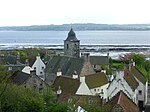East Grange (Fife) railway station
1850 establishments in Scotland1958 disestablishments in ScotlandBlairhallDisused railway stations in FifeFife railway station stubs ... and 5 more
Former North British Railway stationsPages with no open date in Infobox stationRailway stations in Great Britain closed in 1958Railway stations in Great Britain opened in 1850Use British English from November 2019
East Grange railway station served the area of East Grange, Fife, Scotland, from 1850 to 1958 on the Stirling and Dunfermline Railway.
Excerpt from the Wikipedia article East Grange (Fife) railway station (License: CC BY-SA 3.0, Authors).East Grange (Fife) railway station
West Fife Way,
Geographical coordinates (GPS) Address Nearby Places Show on map
Geographical coordinates (GPS)
| Latitude | Longitude |
|---|---|
| N 56.0847 ° | E -3.6086 ° |
Address
West Fife Way
West Fife Way
KY12 9PY
Scotland, United Kingdom
Open on Google Maps








